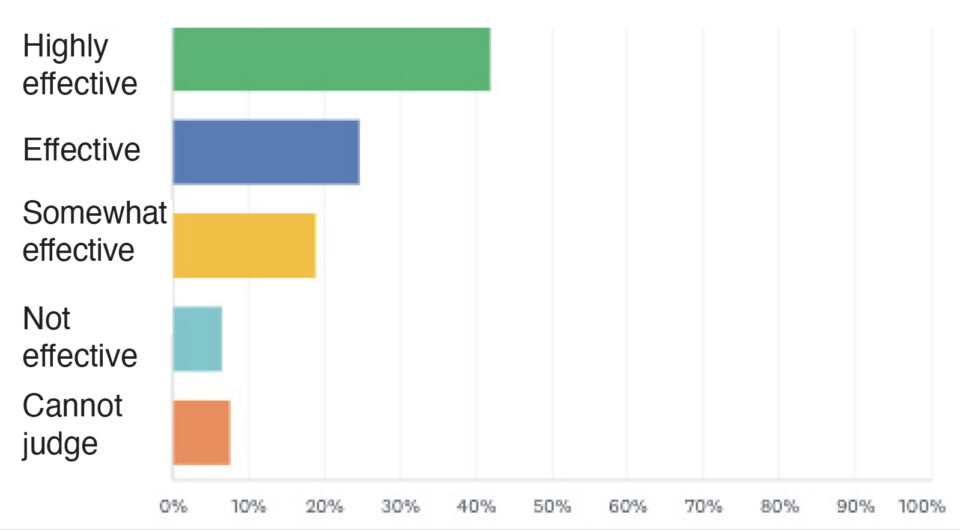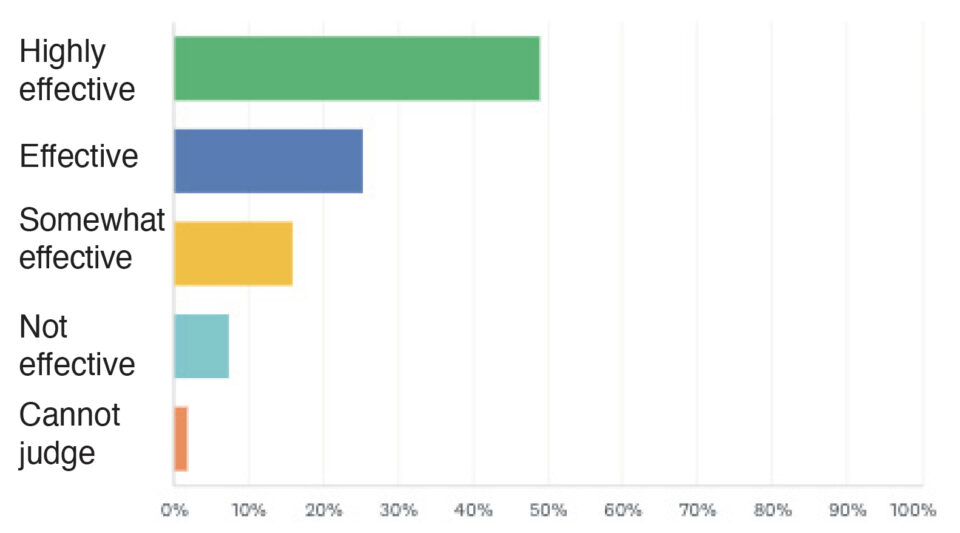Evaluation of administrators
AFT presents results of faculty evaluations of administrators and continues to call for true “360 evaluations” of administrators
by Marianne Kaletzky, AFT 1493 Executive Secretary
This past spring, AFT 1493 launched an online survey to allow all faculty to evaluate the administrators they work with. As many faculty know too well, the current protocols for “360 evaluation” of administrators only allow a few, handpicked faculty and staff members to evaluate each administrator. Moreover, these “360 evaluations” are not anonymous, so faculty may refuse to participate due to fear of retaliation.
|
Faculty’s overall evaluation of deans’ effectiveness by college
Evaluations by 320 faculty polled by AFT 1493 in Spring-Summer 2021 |
All faculty and staff should be able to anonymously evaluate their administrators
As a union, our position is that all faculty and staff should have the opportunity to evaluate their administrators—just as all students have the opportunity to evaluate faculty. Since the District has not instituted a true 360 evaluation process, we created one. On May 11, 2021, all faculty were sent a unique link allowing them to evaluate their dean, a college VP, their college President, and Chancellor Claire. Several reminders were subsequently sent. Ultimately, out of 926 invitees, 320 faculty participated in our evaluation process. Moving forward, AFT plans to present the data to Chancellor Claire so that he and his cabinet can share it with individual administrators. We will also request that our District adopt the tool we developed, or a similar one, that will allow all faculty and staff to participate in a true 360 evaluation of administrators.
Of these 320 faculty, 59% were full-time and 41% were part-time. The three colleges were all well represented, with 38% of responses from Skyline, 38% from CSM, and 24% from Cañada.
Most deans were rated were rated as “effective” or “highly effective”
In general, deans at all three colleges received fairly high ratings, with 47% of faculty describing their dean as “highly effective,” 24% describing their dean as “effective,” 17% describing their dean as “somewhat effective,” “8% describing their dean as “not effective,” and 4% saying that they could not judge. Faculty were asked a total of 22 questions about their deans. View the results for Cañada deans here, the results for CSM deans here, and the results for Skyline deans here. (Note: at this point AFT is only making public aggregate data for deans at each college, although we may share data regarding individual administrators in the future if the District is not responsive to our request to begin a true 360 evaluation process.)
Two deans were rated as more ineffective
However, there were exceptions to faculty’s generally positive evaluations of deans. On average, 74% of faculty who gave their dean a rating (as opposed to “cannot judge”) said their dean was either “highly effective” or “effective.” However, two deans—one at Cañada and one at Skyline—had fewer than 50% of ratings in the “highly effective” and “effective” categories. (For this count, we did not include deans who received fewer than 5 total ratings due to the small sample size in their cases.)
Ratings of Vice Presidents were lower
College vice presidents across the District generally received lower ratings than deans. 17% of respondents rated their VP as “highly effective”’ 22% rated their VP “effective”; 20% rated their VP “somewhat effective”; 26% rated their VP “not effective,” and 14% said they could not judge. Of faculty who gave their VP a rating, only 45% described the VP as “highly effective” or “somewhat effective.” Two individual VPs had more ratings in the “somewhat effective” and “not effective” categories than in the “highly effective” and “effective” categories. View all results for District VPs.
Cabinet-level administrators’ ratings ranked between those of deans and VPs
Finally, cabinet-level administrators, including Kim Lopez (as the Interim President of CSM), Jamillah Moore (at the time President of Cañada), Skyline President Melissa Moreno, and Chancellor Mike Claire averaged ratings that fell between those of deans and those of VPs. 28% of respondents gave Cabinet-level administrators a rating of “highly effective,” with 30% giving them a rating of “effective,” 16% giving them a rating of “somewhat effective,” 16% giving them a rating of “not effective,” and 9% saying they could not judge.
64% of responses that rated cabinet-level administrators described them as “highly effective” or “effective.” However, one of these administrators was an outlier, receiving more ratings in the “somewhat effective” and “not effective” categories than in the “highly effective” and “effective” categories. View all results for cabinet-level administrators.
Moving forward, AFT hopes to work with District administrators, Academic and Classified Senates, CSEA, and AFSCME to institute a process that allows all faculty and staff to evaluate the administrators they work with. We are also hopeful that administrators will act on the data we share with them to improve working conditions in our District.



